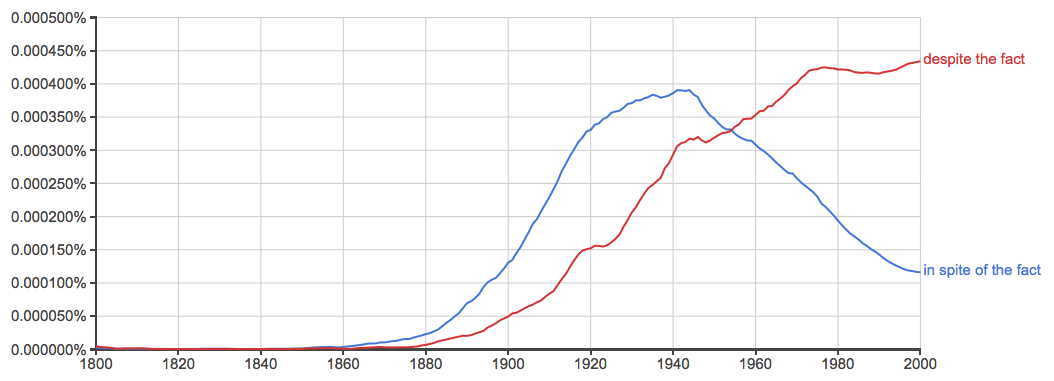Sometimes, differences in language do not boil down to a right and a wrong option. Style may dictate that one word or phrase is preferable to another, but neither is erroneous.
Such is the case with despite vs. in spite of. These phrases mean the same thing and are basically interchangeable, but one is probably a smarter choice for some writing contexts.
What is the Difference Between In Spite of and Despite?
In this article, I will compare the prepositions in spite of vs. despite. I will provide example sentences for both terms.
Plus, at the end, I will outline a helpful mnemonic that you can use to decide which one you should use in your own writing.
When to Use In Spite Of
 What does in spite of mean? In spite of is a phrasal preposition. It means unaffected by something. You can see the proper use of this phrase in the sentences below.
What does in spite of mean? In spite of is a phrasal preposition. It means unaffected by something. You can see the proper use of this phrase in the sentences below.
- Congress passed the bill, in spite of frequent objections from vocal constituents.
- In spite of being on a diet, I ate some mushroom risotto anyway.
- My daughter went to the basement to get the cat food, in spite of her fears.
- So the visitor returns thankful for much of what he has seen, and, in spite of everything, an optimist about what his country might be. –The Wall Street Journal
When to Use Despite
 What does despite mean? Despite is also a preposition. Just like in spite of, it also means unaffected by something.
What does despite mean? Despite is also a preposition. Just like in spite of, it also means unaffected by something.
Here are some examples,
- Despite the best efforts of those who would oppose me, I have emerged victorious.
- Corey ordered a sausage and onion pizza, despite being vegan.
- Arturo continued to argue, despite knowing that he was wrong.
- Coal still produces almost three-quarters of China’s electricity, despite ambitious hydroelectric dam projects and the world’s largest program to install solar panels and build wind turbines. –The New York Times
Despite or In Spite Of? When to Use Each
In spite of and despite are both prepositional phrases, and they share the same definition. They are, for the most part, interchangeable.
As you can see from the following chart, in spite of was the preferred phrase in the 1800s and through the mid-20th century. Despite has enjoyed a recent surge in popularity, becoming the more commonly used term in roughly 1950.

This chart is not scientific in nature, and does not capture the entire spectrum of English usage. It only looks at books written since 1800. Still, it allows us to view a clear picture of long-term trends.
You can probably choose either term in your own writing. Academic and professional writing place value on brevity, making despite the more attractive option in these formal settings. In other contexts, you could choose to let the prosody of the sentence determine which phrase sounds more natural.
For formal writing, remember that despite and deft are each one-word phrases that begin with the letters de-. Since choosing despite is a deft move in formal writing, you can remember that this word is more appropriate in these settings.
Summary
Is it despite or in spite of? Despite and in spite of are prepositions that each mean unaffected by something. They are mostly interchangeable- despite has been more popular since around 1960.
Despite is a better choice for formal writing, where economy of words is important. You can remember that despite is a deft choice for these contexts, since both of those words begin with the letters de-.
If you need more help, you can always check this article for a quick refresher.
Contents
